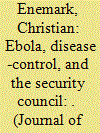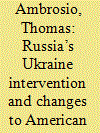|
|
|
Sort Order |
|
|
|
Items / Page
|
|
|
|
|
|
|
| Srl | Item |
| 1 |
ID:
152722


|
|
|
|
|
| Summary/Abstract |
How significant is gender in explaining US public opinion regarding civilian casualties inflicted by the US military during combat and counterterror operations? For answers, we test experimental treatment models on original data obtained from pre-election and post-election surveys conducted as part of the 2014 Cooperative Congressional Election Study. Our evidence supports prior claims that women support military action more reluctantly than men, but, much like men, condition their positions on the accompanying human costs. We find, nonetheless, that women are less likely to support attacks that might bring high numbers of civilian deaths, and, unlike men, base their support on the potential gains from an attack. Indeed, we conclude that differences in support for military action between men and women stem more from the perceived benefits of the attacks than from human costs.
|
|
|
|
|
|
|
|
|
|
|
|
|
|
|
|
| 2 |
ID:
152720


|
|
|
|
|
| Summary/Abstract |
In 2014, the United Nations Security Council (UNSC) described the Ebola outbreak then ongoing in West Africa as “a threat to international peace and security.” Resolution 2177 was the first time a disease outbreak of natural origin had been described using language ordinarily applied to political violence. This article assesses the significance of Resolution 2177 as an instrument of health governance, with particular regard to the Council’s primary aim: to bring about the lifting of state-imposed bans on travel to and from West Africa. The UNSC’s response might at first appear to have been an international-level attempt to remove Ebola from the realm of security policy for the sake of public health. However, the use of threat language in Resolution 2177, alongside the rapid mobilization of disease-control resources by some governments represented on the Council, suggests that some kind of security logic was driving the international response to Ebola. I posit that it was not the logic of securitization, based upon the use of borders as barriers to contagion, that drove UN policy. Rather, the UNSC appears to have acted according to the security logic of governmentality, whereby the health of populations (within and beyond West Africa) would be secured by facilitating cross-border circulation of medical professionals. The Council’s contribution to health governance was to support a shift in security logic: from securitization to securing circulation.
|
|
|
|
|
|
|
|
|
|
|
|
|
|
|
|
| 3 |
ID:
152719


|
|
|
|
|
| Summary/Abstract |
How do sanctions affect the dynamics of political violence in target states? More specifically, how might sanctions affect domestic terrorism in these states? The literature on the consequences of sanctions in target states is rich, yet there has been limited research on how sanctions affect terrorism in target states. In this article, I argue that economic deprivation associated with costly sanctions makes recruiting and carrying out attacks easier for domestic terrorist organizations. Building on work that examines the consequences of sanctions and the economic roots of terrorism, I suggest that sanctions impose economic hardship on regular citizens, who are then more likely to turn to anti-government violence. The result is that the pool from which terrorist groups recruit is broadened during sanctions. I test this argument quantitatively and find support for the hypothesis that costly sanctions lead to higher levels of domestic terrorism.
|
|
|
|
|
|
|
|
|
|
|
|
|
|
|
|
| 4 |
ID:
152723


|
|
|
|
|
| Summary/Abstract |
Practices are capturing increased interest in international relations. Throughout this article, I demonstrate that the body of work under review contributes to a progressive research agenda in world politics. As such, the high quality of the books under review attests to the dynamism of the practice turn. This review puts forward two main arguments. First, I distinguish at least four different forms of a practice approach on display in the reviewed books. Second, I suggest that practice is an essentially contested concept. Overall, this review article highlights some trends flowing from these books as well as some questions that remain either underdeveloped or unanswered.
|
|
|
|
|
|
|
|
|
|
|
|
|
|
|
|
| 5 |
ID:
152718


|
|
|
|
|
| Summary/Abstract |
The Russian Federation’s intervention in Ukraine in the spring of 2014 triggered a significant shift in the US government’s perception of that country. Before that event, statements by US officials depicted Russia as a non-threatening potential partner with compatible interests and common security concerns. After the Ukraine intervention, officials characterized Russia as a significant threat to the United States, its allies, and the European regional order. This article explains why the intervention precipitated such a profound change in American threat perceptions—that is, it links the action (Russia’s intervention in Ukraine) to the reaction (the US change in threat assessments). Through a detailed examination of executive branch testimony to the House and Senate Armed Services Committees from January 2008 to February 2016, this article demonstrates that Russia’s intervention in Ukraine was seen by the United States as an unacceptable breach of international law and norms, including the principles of state sovereignty, the sanctity of borders, and territorial integrity. From the American perspective, Russia’s violation of these fundamental rules necessitated a questioning of prevailing American assumptions about Russia. Furthermore, the potential for future aggression by Russia had to be taken seriously. It was this factor of Russia as a “rule breaker” that directly led the United States to reassess the threat posed to it by Russia, rather than alternative explanations such as the application of new Russian military tactics, an increase in Russian military capabilities, politics surrounding Russian national identity or system of government, or Ukraine’s geopolitical value to the United States.
|
|
|
|
|
|
|
|
|
|
|
|
|
|
|
|
|
|
|
|
|